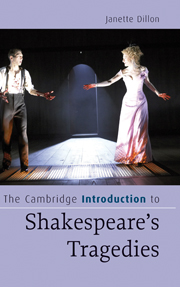Book contents
- Frontmatter
- Contents
- Acknowledgements
- Introduction
- Chapter 1 Tragedy before Shakespeare
- Chapter 2 Titus Andronicus
- Chapter 3 Romeo and Juliet
- Chapter 4 Julius Caesar
- Chapter 5 Hamlet
- Chapter 6 Othello
- Chapter 7 Timon of Athens
- Chapter 8 King Lear
- Chapter 9 Macbeth
- Chapter 10 Antony and Cleopatra
- Chapter 11 Coriolanus
- Notes
- Index
Chapter 11 - Coriolanus
Published online by Cambridge University Press: 05 August 2015
- Frontmatter
- Contents
- Acknowledgements
- Introduction
- Chapter 1 Tragedy before Shakespeare
- Chapter 2 Titus Andronicus
- Chapter 3 Romeo and Juliet
- Chapter 4 Julius Caesar
- Chapter 5 Hamlet
- Chapter 6 Othello
- Chapter 7 Timon of Athens
- Chapter 8 King Lear
- Chapter 9 Macbeth
- Chapter 10 Antony and Cleopatra
- Chapter 11 Coriolanus
- Notes
- Index
Summary
Following the scripting of a central female figure and a playful opening up and crossing of genders in Antony and Cleopatra, this play returns to the male-dominated world of Julius Caesar and Timon of Athens. Like all three of those earlier plays, its source is North's Plutarch, and like Antony, Julius Caesar and Titus Andronicus, it is set in Rome; but where Antony and Julius Caesar were set in the last days of the Roman Republic, Coriolanus is set much earlier, soon after its establishment following the expulsion of the Tarquins. The exploration of what it means to be Roman reaches a new intensity in this play; but at the same time its links with contemporary Jacobean politics are more directly topical than those of any of Shakespeare's earlier tragedies. Where Julius Caesar, for example, may point to the general political unease of the late 1590s and to questions of government made sharper by the looming problem of a successor to Elizabeth, Coriolanus points very specifically to the Midlands Rising of 1607 and possibly also to clashes between James and his parliaments and to the process of parliamentary selection, matters widely discussed, according to Robert Cecil, Secretary of State: ‘Parliamentary matters are ordinarily talked of in the streets. I have heard myself, being in my coach, these words spoken aloud: “God prosper those that further the overthrow of these monopolies. God send the prerogative touch not our liberty.”’ Though Cecil was writing in 1601, matters of liberty and prerogative (sovereign right) remained of central concern throughout the reign of James I and are also central to this play. Timon, Lear and Macbeth allude quite closely to matters of court and state, but Coriolanus is unusual in engaging so directly with a popular event like a rising, and one that bore more closely on Shakespeare's Stratford connections than on his connections with the court via the King's Men; for the Midlands Rising, as the name indicates, took place across several Midlands counties, including Warwickshire.
- Type
- Chapter
- Information
- The Cambridge Introduction to Shakespeare's Tragedies , pp. 140 - 152Publisher: Cambridge University PressPrint publication year: 2007

